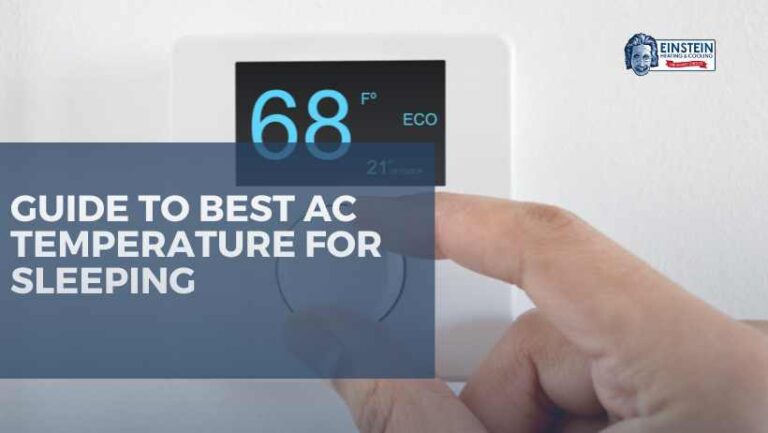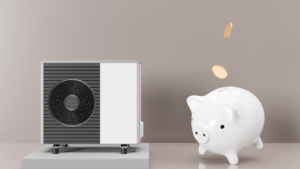Achieving a comfortable and restful night’s sleep is essential for overall health and well-being. Many factors contribute to sleep quality–one of the crucial elements is room temperature. The best AC temperature for sleeping plays a significant role in promoting relaxation throughout the night. In this comprehensive guide, we’ll explore the best AC temperature for sleeping and how it can positively impact your sleep quality as well as the best AC brands for a quiet sleeping.
Factors Influencing the Ideal AC Temperature
Body Temperature Regulation
- The human body has a natural circadian rhythm that regulates its temperature throughout the day and night. During sleep, the body’s core temperature typically decreases slightly, signaling the onset of rest. Setting the AC temperature to facilitate this natural cooling process can enhance sleep onset and duration.
Room Temperature
- The ambient temperature of the bedroom is crucial for creating a comfortable sleep environment. Research suggests that a room temperature between 60 to 67 degrees Fahrenheit (15.5 to 19.5 degrees Celsius) is optimal for most people to promote sleep quality. This temperature range helps the body maintain its natural cooling process without feeling too cold or too hot. Make sure that your HVAC maintenance is up to date to avoid temperature issues.
Personal Preference
- Individual preferences vary when it comes to room temperature for sleeping. Factors such as age, gender, weight, and overall health can influence one’s comfort level with different temperatures. Some people may prefer a slightly warmer or cooler room, depending on their personal comfort preferences and sleep habits.
Bedding and Clothing
- The best air con temp for sleeping can be subjective to some as well as the type of bedding and clothing used. The type of bedding and clothing worn to bed can also affect how sensitive an individual is to room temperature. Light, breathable bedding materials such as cotton or linen can help regulate body temperature and prevent overheating. Similarly, wearing lightweight sleepwear or sleeping naked can promote better airflow and cooling during sleep.
Humidity Levels
- In addition to temperature, humidity levels in the bedroom can impact sleep quality. High humidity can make the room feel warmer and cause discomfort, while low humidity can lead to dryness and irritation. Maintaining a relative humidity level between 30% to 50% can help create an optimal sleep environment by preventing excessive moisture buildup or dry air.
Sleep Environment
- Factors such as noise, light, and air circulation can also influence the perception of room temperature and overall sleep quality. A quiet, dark, and well-ventilated bedroom can enhance the effectiveness of the AC temperature in promoting restful sleep. Blocking out external noise and light sources and ensuring proper airflow with a fan or open window can complement the cooling effects of the AC.
Sleeping Position
- The way a person sleeps can affect their body’s temperature regulation and comfort level during the night. For example, sleeping in a curled-up position may trap heat more than sleeping on your back or side with limbs extended. Understanding how different sleeping positions affect comfort can help adjust the AC temperature accordingly to promote better sleep quality.
Benefits of Optimal AC Temperature for Sleeping
Improved Sleep Quality
- Maintaining the optimal AC temperature can significantly improve the quality of sleep by promoting relaxation and reducing nighttime awakenings. A comfortable sleep environment enhances sleep efficiency and allows individuals to experience deeper, more restorative sleep cycles.
Enhanced Comfort
- Sleeping in a room with the right temperature ensures greater comfort throughout the night, minimizing discomfort from feeling too hot or too cold. This comfort promotes uninterrupted sleep and allows individuals to wake up feeling refreshed and rejuvenated in the morning.
Regulated Circadian Rhythm
- Setting the AC temperature to align with the body’s natural circadian rhythm supports the regulation of sleep-wake cycles. Consistently maintaining a conducive sleep environment can help reinforce healthy sleep patterns and improve overall sleep quality over time.
Better Health Outcomes
- Adequate and quality sleep is essential for overall health and well-being. By finding the best AC temperature for sleeping, individuals can support their physical and mental health, reducing the risk of chronic conditions such as obesity, diabetes, and cardiovascular disease associated with poor sleep habits.
Increased Productivity and Alertness
- Quality sleep contributes to improved cognitive function, concentration, and productivity during waking hours. By ensuring optimal AC temperature for sleeping, individuals can wake up feeling more alert, focused, and ready to tackle the day’s tasks effectively.
Tips for Setting the Best AC Temperature for Sleeping
Experiment and Adjust
- Finding the best temperature for sleep may require some trial and error. Experiment with different temperature settings within the recommended range and observe how they affect your sleep quality. Adjust the temperature as needed based on personal comfort and preferences.
Use Programmable Thermostat
- Utilize a programmable thermostat to set your desired AC temperature automatically throughout the night. Program the thermostat to lower the temperature slightly before bedtime to initiate the body’s natural cooling process and create a comfortable sleep environment.
Maintain Consistency
- Consistency is key to establishing healthy sleep habits and optimizing sleep quality. Maintain a consistent AC temperature each night to support your body’s circadian rhythm and promote better sleep patterns over time.
Create a Cool Sleep Environment
- In addition to setting the AC temperature, take steps to create a cool and comfortable sleep environment. Use blackout curtains to block out light, minimize noise disruptions, and ensure proper airflow with a fan or air purifier to enhance the cooling effects of the AC.
Stay Hydrated
- Proper hydration is essential for maintaining optimal body temperature regulation during sleep. Drink an adequate amount of water throughout the day to prevent dehydration, which can interfere with your body’s ability to cool down and maintain a comfortable sleep temperature.
Comparing AC Brands
1. Energy Efficiency
When it comes to air conditioners, energy efficiency is a critical factor to consider. Not only does it impact your electricity bills, but it also contributes to environmental sustainability.
SEER Rating
- SEER (Seasonal Energy Efficiency Ratio) is a standard measure of an air conditioner’s efficiency. The higher the SEER rating, the more energy-efficient the unit is. Leading the pack in this aspect are brands like Carrier and Lennox, with SEER ratings often exceeding industry standards.
Inverter Technology
- ACs equipped with inverter technology are known for their superior energy efficiency. Brands such as Daikin and Mitsubishi Electric have pioneered the use of inverter compressors, allowing for variable speed operation and better energy utilization.
ENERGY STAR Certification
- Opting for an AC brand with ENERGY STAR certification ensures that the unit meets strict energy efficiency guidelines set by the U.S. Environmental Protection Agency. Brands like Trane and Rheem consistently produce models that bear the ENERGY STAR label, signifying their commitment to sustainability.

2. Cooling Performance
The primary function of an air conditioner is to cool the indoor space effectively. Different brands employ various technologies to enhance their cooling performance.
Cooling Capacity
- The cooling capacity of an AC is measured in BTUs (British Thermal Units). It’s crucial to choose a unit with the right BTU rating for your room size. Brands like LG and Samsung offer a wide range of models catering to different cooling needs.
Multi-Stage Cooling
- ACs with multi-stage cooling capability adjust their performance based on the current cooling requirements. This results in more consistent and comfortable indoor temperatures. Brands like York and Goodman are known for their advanced multi-stage cooling systems.
Smart Cooling Features
- In the era of smart homes, many AC brands integrate cutting-edge technologies for enhanced cooling control. Brands such as Panasonic and Haier offer Wi-Fi-enabled AC units that can be controlled remotely through smartphone apps, providing convenience and efficiency.
3. Durability and Reliability
Investing in a durable and reliable air conditioner is essential for long-term satisfaction. Consider factors such as build quality, warranty, and brand reputation.
Build Quality
- Brands like American Standard and Bryant are renowned for their sturdy build quality. Choosing an AC with durable components ensures longevity and reduces the frequency of maintenance issues.
Warranty Coverage
- A comprehensive warranty is a testament to the manufacturer’s confidence in its product. Rheem and Lennox are examples of brands offering extended warranties, providing peace of mind for consumers.
Brand Reputation
- Researching a brand’s reputation can be a valuable indicator of its reliability. Trane and Carrier, with their long-standing presence in the market, have earned a reputation for producing dependable and durable air conditioning units.
4. Noise Levels
The noise produced by an air conditioner can significantly impact your comfort, especially in bedrooms or living spaces. Consider brands that prioritize quiet operation as well as easy AC cleaning as this can affect the noise levels.
Decibel Levels
- Brands like Fujitsu and Sanyo are recognized for producing air conditioners with low decibel levels. Quiet operation is achieved through advanced noise reduction technologies, ensuring a peaceful indoor environment.
Noise Reduction Features
- Some brands go the extra mile by incorporating noise-reduction features, such as variable-speed fans and insulated compressors. Look for AC models from brands like Amana and Frigidaire that prioritize minimizing noise without compromising performance.
User Reviews and Feedback
- Reading user reviews and feedback provides real-world insights into the noise levels of different AC models. Brands like Mitsubishi Electric and Goodman often receive positive reviews for their quiet and efficient operation. Also, don’t forget to only trust reputable and certified HVAC technicians to get the job done.
5. Price and Affordability
While performance is crucial, your budget is also a significant factor when choosing an air conditioner. Evaluate the initial cost, installation expenses, and long-term operational costs.
Initial Cost
- Budget-friendly options from brands like Kenmore and Comfort-Aire offer affordable solutions without compromising on basic features. Comparing the initial costs of different brands can help you find the right balance between affordability and quality.
Installation Costs
- Some brands, such as Carrier and Trane, may have higher installation costs due to the complexity of their systems. Factor in HVAC installation expenses when evaluating the overall affordability of an air conditioner.
Operational Costs
- Consider the long-term operational costs, including energy consumption and maintenance. Brands like York and Rheem are known for producing energy-efficient models that can lead to lower operational expenses over time.
6. Whisper-Quiet Operation
For a bedroom AC, noise levels play a pivotal role in ensuring the best temperature for sleep. Opting for models designed with whisper-quiet operation can make a substantial difference in your sleep quality.
Mitsubishi Electric MSZ-FH15NA
- Mitsubishi Electric is renowned for its advanced technologies, and the MSZ-FH15NA is no exception. This split-type AC unit operates at extremely low decibel levels, ensuring a peaceful atmosphere conducive to sleep. The inverter technology also maintains a consistent temperature, eliminating disruptive fluctuations.
Daikin FTXB Series
- Daikin’s FTXB series is celebrated for its silent operation, making it an excellent choice for bedrooms. The indoor unit’s quiet mode reduces noise levels to a minimum, allowing you to enjoy a restful sleep without disturbances.
LG Dual Inverter Smart Wi-Fi Enabled Window Air Conditioner
- For those preferring window units, LG’s Dual Inverter technology stands out. This AC model operates quietly even at higher cooling capacities, providing efficient cooling without disruptive noise, and creating an ideal sleeping temperature and environment.
7. Sleep Mode Features
Several air conditioners come equipped with specialized sleep mode features designed to gradually adjust temperature settings throughout the night, promoting better sleep cycles.
Panasonic Exterios E Series
- Panasonic’s Exterios E series includes a sleep mode that not only adjusts the temperature but also controls humidity levels for optimal comfort. The gradual changes mimic the body’s natural sleep pattern, contributing to a more restful night’s sleep.
Carrier Infinity 26 Air Conditioner
- The Carrier Infinity 26 features a sleep mode that not only regulates temperature but also monitors and adjusts humidity levels. This intelligent system ensures a comfortable sleeping environment, adapting to your body’s natural sleep cycle.
Rheem Prestige Series EcoNet-Enabled Air Conditioner
- Rheem’s Prestige Series offers EcoNet-enabled models with a sleep mode that optimizes comfort by adjusting temperature and airflow. The gradual changes enhance sleep quality, making it an excellent choice for those who prioritize a peaceful night’s rest.
Conclusion
Achieving the optimal AC temperature for sleeping is crucial for promoting relaxation, enhancing sleep quality, and supporting overall health and well-being. Incorporating tips for setting the ideal AC temperature as well as contacting an expert HVAC technician from Einstein Heating and Cooling when needed can further enhance sleep quality and contribute to improved physical and mental health outcomes in the long run.








